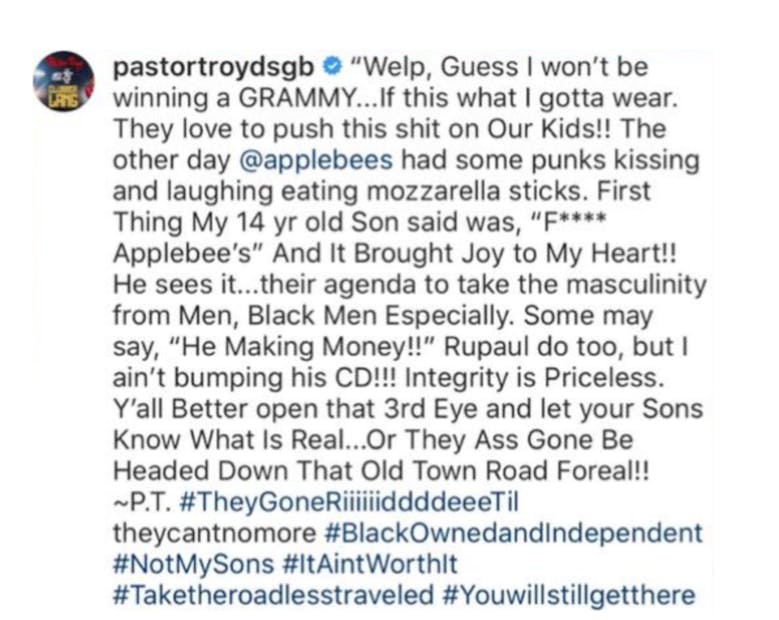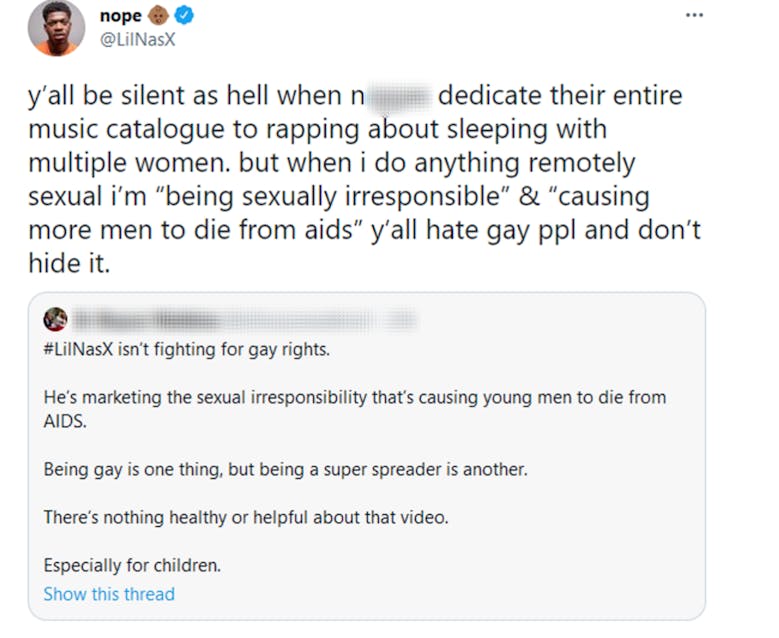Lil Nas X, depicted center, walks down a hallway flanked by backup dancers in his music video Industry Baby, From Old Town Road to Montero: What the meteoric rise of Lil Nas X reveals about the current state of homophobia in the Black community:
“Yeah, I'm gonna take my horse
To the old town road
I'm gonna ride 'til I can't no more…”
“Call me when you want, call me when you need
Call me in the morning, I'll be on the way
Call me when you want, call me when you need
Call me out by your name, I'll be on the way like"
These are just a few of the iconic intros to many of Lil Nas X’s smash-hit songs. If you were to play any of these songs in front of almost any group of individuals belonging to Generation Z, chances are they’d immediately start to sing along to the rest of the song word for word. That’s the insane level of popularity that Lil Nas X’s music has reached, and as of right now, the talented rapper, singer, and songwriter shows no intention of stopping or slowing down.
To understand how he got to where he is now, it’s essential that we go back to the very beginning. Lil Nas’s journey to hip-hop stardom began with his hit single Old Town Road. This “country rap” song went viral in early 2019, quickly climbing the Billboard Hot 100 chart all the way up to the number one spot and staying there for an almost unbelievable 19 weeks. For context, that makes Old Town Road the longest-running number-one song since the Billboard Hot 100 chart debuted way back in 1958. Naturally, tons of memes, remixes, and general talk about the song started to flood the internet. Everywhere on the web you went, you were bound to see his name eventually .
Then, at the very top of his newfound popularity, Lil Nas X did something revolutionary;
He came out as gay.
The news made headlines instantly, and everyone from fans to critics had something to say on the issue. But, unfortunately, some of Lil Nas X’s loudest critics came from his community, the Black community.
Older Black people- think Generation X and Baby Boomers- were quick to voice their disapproval and disgust. They openly touted fears about Lil Nas X being a “bad influence” on their children and/or grandchildren, and about how if he was going to be a pop star, he “shouldn’t talk about his chosen lifestyle.” They also heavily criticized Lil Nas X’s choice of clothing as he continued to be spotlighted by the music industry.
Take a look at this Instagram caption made by 43-year-old Pastor Troy, a famous Black American rapper and record producer, commenting on the bright pink Versace suit that Lil Nas X wore to the Grammys in January of 2020;

Credit: Pastor Troy, Instagram
Sadly, this bigotry wasn’t limited to solely older members of the Black community. Some Black Millennials and groups of Gen Z-ers reacted similarly, claiming that they liked him before, but they couldn’t listen to him anymore since he was gay. As Lil Nas X continued to express his sexuality through his songs and music videos, the outcries of disapproval from the Black community became even more rampant.
This type of blatant homophobia in our community isn’t new.
Queer artists in hip hop have always faced a double standard in the Black community.
It’s culturally acceptable for their straight counterparts to sexualize themselves in their songs and videos. Straight male rappers frequently surround themselves with scantily clothed, attractive dancers in their videos, and no one bats an eyelash. Then Queer artists turn around and do the same thing, and suddenly it’s a massive topic of nationwide debate.
Lil Nas X has been particularly outspoken in pointing out this kind of hypocrisy. He took to Twitter to respond to criticism calling the music video for his hit song Industry Baby, which featured him dancing sexually with other black men, “sexually irresponsible”;

Lil Nas X’s response to online criticism of his music video for his song Industry Baby.
Credit: Lil Nas X, Twitter
Overall the reaction that Lil Nas X has received has made it clear as day that the Black community still has a homophobia problem.
The question is, how can this problem be addressed?
Well, for one, it starts with education. As is demonstrated by the tweet above, many members of the Black community still unfairly associate gay black men with HIV and AIDS. Putting out the message through advocacy groups and informative pamphlets that these are not “gay men’s diseases” is an essential first step in dismantling the stigma surrounding homosexuality in the Black community. Another vital step comes through Black community leaders, particularly religious ones, using their pulpits to speak up to support the LGBTQ+ community. Seeing important fixtures in their community advocate for queer individuals could go a long way towards making the Black community more sympathetic towards LGBTQ+ causes. However, the most impactful approach in tackling homophobia in the Black community starts right at home. Younger Black parents need to be proactive in teaching their children to be allies of queer people, so that said children don’t end up taking on the views and values of some of the older, homophobic members of their community.
None of these various approaches will be completed within the next day, or month, or even the next five years. The task before the Black community brings to mind the popular American saying that “Rome wasn’t built in a day.”, which conveys the truth that complex, multifaceted endeavors will always take an extended amount of time to complete.
However, this famous phrase is only part of the whole adage. The full adage is, “Rome wasn’t built in a day, but they were laying bricks every hour.”
It’s well past time for us members of the Black community who support our queer counterparts to start laying bricks. For decades, our community has unfairly ostracized, demonized, and penalized these individuals based on their sexuality alone. Thankfully, there’s another popular saying that can be applied to our situation;
“You was never really rootin' for me anyway
When I'm back up at the top I wanna hear you say.”



